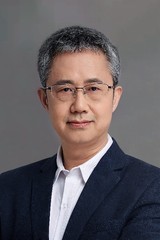Personal photos
Personal introductionTie Jun Cui received the B.Sc., M.Sc., and Ph.D. degrees in electrical engineering from Xidian University, Xi'an, China, in 1987, 1990, and 1993, respectively. In March 1993, he joined the Department of Electromagnetic Engineering at Xidian University and was promoted to Associate Professor in November 1993. From 1995 to 1997, he was a Research Fellow with the Institut für Hochstfrequenztechnik und Elektronik (IHE) at the University of Karlsruhe, Germany. In July 1997, he joined the Center for Computational Electromagnetics, Department of Electrical and Computer Engineering, University of Illinois at Urbana-Champaign, first as a Postdoctoral Research Associate and then as a Research Scientist. In September 2001, he was a Cheung-Kong Professor with the Department of Radio Engineering, Southeast University, Nanjing, China. Currently, he is the chief professor at Southeast University. He is also the founding director of the Institute of Electromagnetic Space at Southeast University. Dr. Cui’s research interests include metamaterials and computational electromagnetics. He proposed the concepts of digital coding and programmable metamaterials and realized their first prototypes, based on which he founded the new direction of information metamaterials, bridging the physical and digital worlds. Dr. Cui is the first author of Metamaterials: Theory, Design, and Applications (Springer, Nov. 2009); Metamaterials: Beyond Crystals, Noncrystals, and Quasicrystals (CRC Press, Mar. 2016); and Information Metamaterials (Cambridge University Press, 2021). He has published over 600 peer-reviewed journal papers, which have been cited more than 43000 times (H-Factor 105; Google Scholar), and licensed over 150 patents. Dr. Cui was awarded a Research Fellowship from the Alexander von Humboldt Foundation, Bonn, Germany, in 1995, received a Young Scientist Award from the International Union of Radio Science in 1999, was awarded a Cheung Kong Professorship by the Ministry of Education, China, in 2001, and received the National Science Foundation of China for Distinguished Young Scholars in 2002. Dr. Cui received the Natural Science Award (first class) from the Ministry of Education, China, in 2011, and the National Natural Science Awards of China (second class, twice), in 2014 and 2018, respectively. His research has been selected as one of the most exciting peer-reviewed optics research projects in Optics in 2016 by Optics and Photonics News Magazine, 10 Breakthroughs of Chinese Science in 2010, and many Research Highlights in a series of journals. His work has been widely reported by Nature News, MIT Technology Review, Scientific American, Discover, New Scientists, etc. Dr. Cui is an academician of the Chinese Academy of Science and an IEEE Fellow. He served as Associate Editor of IEEE Transactions on Geoscience and Remote Sensing and Guest Editor of Science China: Information Sciences, Science Bulletin, IEEE JETCAS, and Research. Currently, he is the Chief Editor of Metamaterial Short Books at Cambridge University Press, the Editor of Materials Today Electronics, the Associate Editor of Research, and one of the Editorial Board Members of the National Science Review, eLight, PhotoniX, Advanced Optical Materials, Small Structure, and Advanced Photonics Research. He presented more than 100 keynote and plenary talks at academic conferences, symposiums, or workshops. In 2019–2021, he was ranked in the top 1% of highly cited papers in the field of physics by Clarivate Web of Science (Highly Cited Researcher).
|


